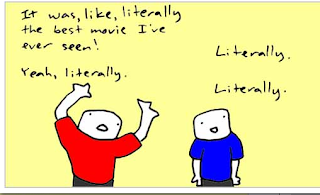For a long time, I’ve written
down my thoughts about and reactions to the way the English language is used or
misused today and it’s time I drew a conclusion or three. I’m not a collector
of things. The only collection I have is one of words and languages and usage.
To come across the following is a moment of discovery, of pleasure: “It's
thought that one in 50 people may have prosopagnosia,
or face blindness.” (BBC 010716). The OED defines it as: “An inability to
recognize a face as that of any particular person.” What a marvellous word;
fancy that, somebody gave it a name, a psychiatrist, of course.
I’ve spent a lot of time
expressing horror about things like: “Does the living wage mean less jobs?” (Press Association, 30 Sept
16) or gobbledygook such as: … your back
story, rather than your ideas, is of greatest importance.” (Spectator
15.10.16). I used to panic when I saw words like: salacity, to critique,
religiosity; they seem to be American creations but they go back a long way in
English history. Dangerosity, I always used to think it was an invention of
George W. Bush and indeed it must be; the OED doesn’t recognise it. George W.
is the President who wanted to do away with all taxes, including syntax. “Rallies
of this scale are unusual in Morocco.
(BBC).
A major complaint of mine has
been that we don’t have any discussion of language and grammar in our media,
written or spoken. The one exception I can think of is a weekly column in the
Spectator by Dot Wordsworth (sic), my apologies to her; it’s an interesting
column, if a little abstruse. Le Figaro published an interview with Julien
Barret on 01.11.16, entitled: «La langue
française est discriminante», discriminatory because Il y a une tyrannie du bon usage, there is a tyrannical concern with correctness. Mr Barret says there are
several types of French, some more correct than others. Of course, he’s right. He
cites the example of those who say, wrongly he claims, une pipe en écume de mer which is a corruption of the popular
French expression une pipe de Kummer. Whereas,
in fact, écume de mer is literally sea foam or meerschaum in German, which gives us our Meerschaum pipe.
Zoologists know this substance as sepiolite.
It doesn’t matter that this detail is incorrect; what counts is the discussion about
the French language. Le Figaro closes the article with an explanation of how to
avoid mistakes with one of the French language’s most troublesome points of
grammar, the agreement of the past participle. Most French speakers have
problems with this. I take my hat off to them. If only we could have similar
kinds of discussion in our newspapers.
I have come to the conclusion that
the English language is now a fashion item. By talking about the numbers and going south you want to be identified with the financial community,
to be part of a clique. Others talk about the bottom line and begin every sentence with so because they think the American touch is best. But, there again,
it’s probably subconscious, like their taste in music, it’s simply just got to
be fashionable, or what they take to be fashionable. Ah, well.






